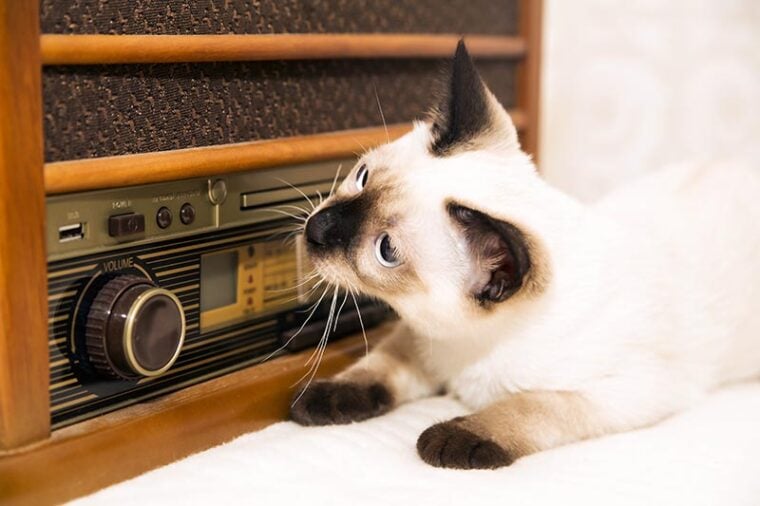
Music has been a cornerstone in our lives for ages. Currently, with the ease of telling Alexa to turn on your favorite playlist, music has become more prevalent than ever. Working, exercising, and cleaning are only a few of the things we do with music in the background. For some, they say music keeps them going to get the job done. Others use music as a way to relax and unwind at the end of the day by turning on a bit of classical or soft jazz.
For most of us, we get lost in a zone when the music is playing. We’re either relaxed, vitalized, or entranced by the tones. What about the animals in our lives though? When our playlists are blaring, they have no choice but to listen. We’ve all heard the phrase, music can soothe the savage beast, but is it true? What about cats and their tendency to be a bit anxious around loud sounds and changes in the environment? For years, scientists have been studying this exact question. As it turns out, classical music has shown that it can help cats relax. To further that realization, classical tones that specifically cater to cats have been created.
Let’s learn more so that the next time your cat needs help relaxing before a trip to the vet or after a particularly stressful day, you can select a playlist to help cater to their needs.
Cats and Classical Music
While classical music’s ability to calm humans has been known for years, it isn’t surprising that scientists wanted to determine whether it had the same effects on cats. Sure, we can play a bit of Bach or Beethoven and notice that our cat seems to chill out at home, but we aren’t able to truly gauge what’s happening inside. In a study published in 2016 1, veterinarians decided to test how cats reacted to different musical stimuli while under sedation. They did this by placing heart monitors on the 12 cats’ tongues and then playing different music while they studied the reactions.
As expected, classical music is where cats seemed to be calmest and their heart rate lowered. When the cats were played hard rock music, the heart rate rose. Soft pop music seemed to have no effect one way or the other. The study seemed to show that cats are a lot like humans when it comes to their musical preferences. When relaxation is needed, more soothing tones are required. If you want to hype up, toss on a bit of AC-DC to get the blood pumping.

Cat Specific Music
With the calming effects of classical music being praised over the years, it makes sense that more studies would be conducted and music would be made to push the boundaries of what we know concerning cats and their preferences. Having this type of information can help cat owners calm their kitties down before going to the groomer or the vet. They can even play relaxing music for cats before work is done around the house or other stressful situations may occur. But is classical the best choice? It was until cat-specific music made its appearance.
Cat music is designed to adhere to a cat’s vocal range. This range is two octaves higher than that of a human. Cats can also hear far better than we can. While the range in classical music may be soothing to them, cat music is made for them. It includes purring and suckling sounds that are layered into the music to mimic sounds a cat is familiar with from their developmental stages. Research conducted by Louisiana State University in 2019 and published in the Journal of Feline Medicine and Surgery 2 showed that cat-specific music lowered the cat’s stress scores and reduced inflammation markers throughout the study.
Do Cats Like Music?
Determining whether cats like music is a bit more difficult. While their stress levels decrease with cat-specific music and classical music helps them relax, that doesn’t mean they have a preference. Your cat may be fine spending time in the house while you’re away at work without a playlist playing in the background. Other cats may be slightly more nervous and would prefer to have something soothing to help them stay calm. It’s all determined by the cat in question. This is where understanding your pet comes into play.
People have tried for years to understand cats. What we do know is they rely on us to feed, water, love, and care for them. Unfortunately, some cats are more stressed than others. Some are even what you’d consider hyperactive. For those cats, tossing on a bit of classical music, or cat-specific music if you prefer, can help them relax and de-stress. This is especially helpful with anxious or hyper cats who need to leave the home. Calming them beforehand may make your life easier.

Final Thoughts on Cats and Classical Music
Classical music’s ability to calm people and animals has been praised for years. While music is advancing and opening up genres specific to animals, that doesn’t change the fact that classical is here to stay. If you want to play a bit of Beethoven in the background while you and your cat relax after a stressful day, both of you can reap the rewards.
Featured Image Credit: Einar Muoni, Shutterstock







